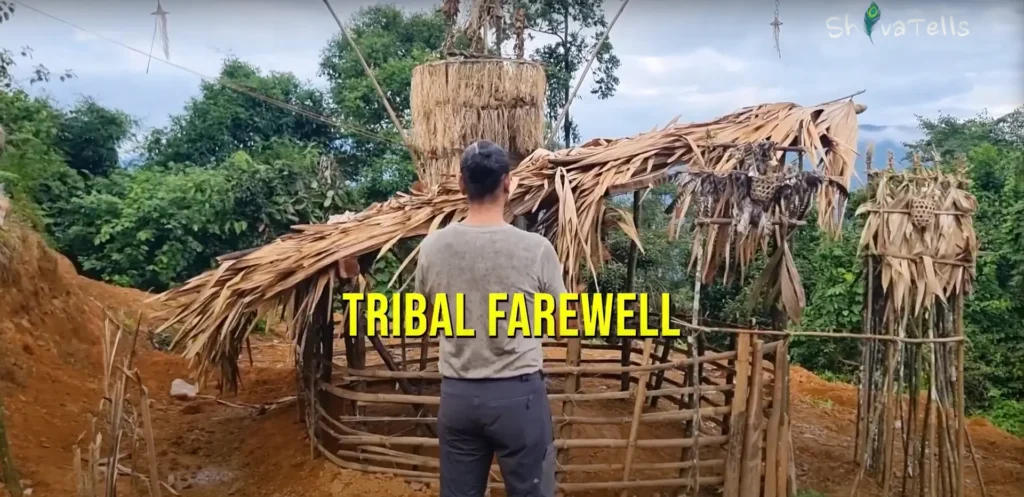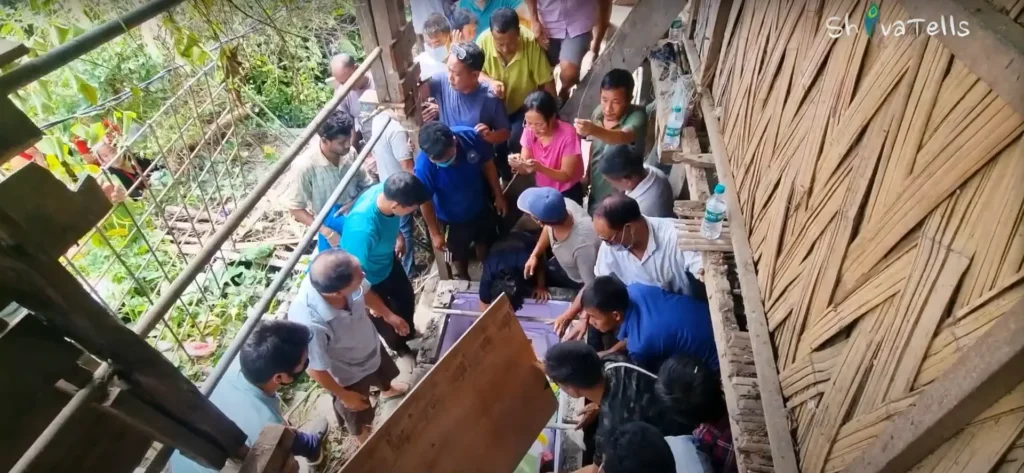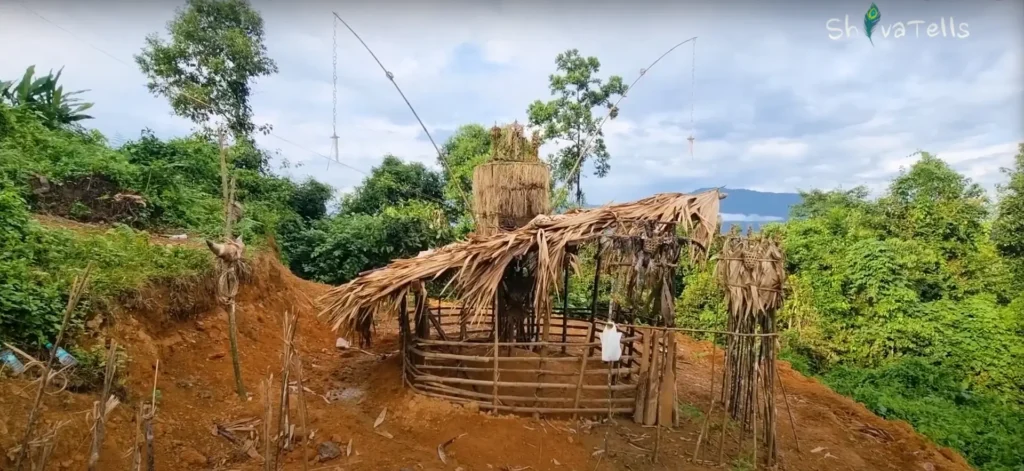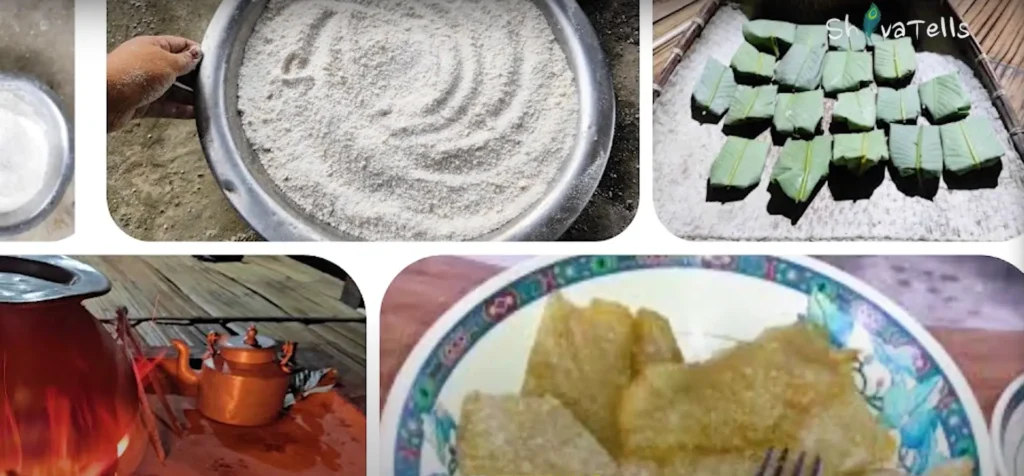Not all goodbyes are filled with tears and somberness. In the remote corners of India, cradled within the verdant hills of Arunachal Pradesh, lies a story that challenges our perception of death. Here, in the Upper Subansiri district, the Tagin Tribe celebrates the departure of a loved one with a unique set of rituals, steeped in the belief that the soul embarks on a new journey.
Intrigued by this unconventional approach to death, I, Shiva, embarked on a quest to document these traditions. My journey led me to a small town, a vibrant tapestry woven with the lives of the Tagin Tribe.

Table of Contents
The Tribal Farewell: Spiritual Cleansing and Chanting

The ceremony was a mesmerizing blend of ancient rituals and deep-rooted faith. A designated priest, his face etched with concentration, chanted prayers in the local dialect. Animal sacrifices were offered, not out of cruelty, but as a way to appease the spirits and ensure a safe passage for the departed soul. This “spiritual cleansing,” as the villagers explained, served a dual purpose: protecting the soul of the deceased and safeguarding the family members from any lingering negativity.
A Final Resting Place: Unveiling the Traditional Tagin Tribe Burial

My quest for a deeper understanding led me beyond the town center. I ventured into the picturesque Jakar Basti, a village known for preserving its traditional ways. There, I met a kind elder who, with a warm smile, led me to a hidden clearing. Here, nestled amidst the towering trees, lay a unique burial ground. Unlike the concrete graves I was familiar with, this one was a testament to the Tagin Tribe’s connection with nature.
The elder explained that the deceased was often buried within the house compound itself, a constant reminder of the love and respect they held for their departed loved one. This unique practice, far from morbid, symbolized the enduring bond that transcended even death.
A Chance Encounter and a Heartfelt Connection During the Farewell
As I documented the burial site, a chance encounter brought a new layer of emotion to my story. Returning to the town center, I met a woman whose eyes welled up as I showed her the footage. She was the wife of the very person I had filmed in Jakar Basti – the wife of the priest who had just passed away.
The sight of her raw emotion, the love etched on her face despite the loss, was a powerful reminder of the universality of grief. It transcended cultural boundaries, a testament to the deep connection we share with those we love.
Finding Peace: A Celebration of Life’s Journey After the Good Bye

Witnessing the Tagin Tribe’s tribal farewell rituals was a humbling experience. It challenged my preconceived notions about death, replacing them with a profound respect for their belief system. Their rituals weren’t about dwelling on loss, but about celebrating a life well-lived and the departed soul’s onward journey.
As I left Upper Subansiri, I carried with me a newfound understanding. Death may be inevitable, but the love and respect we share with our loved ones can transcend even the physical realm. Perhaps, in their own unique way, the Tagin Tribe had shown me a way to find peace – not just for the departed, but for those left behind as well.
This story is just a glimpse into the rich tapestry of traditions practiced by the Tagin Tribe. There’s so much more to discover about their vibrant culture and their way of life. Would you like to hear more about their festivals, their unique attire, or perhaps some of the local delicacies I savored during my travels?
Subansiri District Travel Itinerary
Day 1: Guwahati to Lilabari
- Take a flight from Guwahati to Lilabari Airport (ITI)
- Drive to Lilabari Town (approx. 10 km, 30 minutes)
- Visit the Lilabari Fort and Lilabari Temple
- Explore the Local Market for handicrafts and souvenirs
Day 2: Lilabari to Ziro
- Drive to Ziro (approx. 100 km, 3 hours)
- Visit the famous Ziro Valley, a UNESCO World Heritage Site
- Explore the Talley Valley Wildlife Sanctuary
- Meet the Tagin Tribe and learn about their culture and traditions
Day 3: Ziro Museum
- Visit the Tagin Village and experience their hospitality
- Learn about the Tagin Tribe’s agriculture practices and traditional farming methods
- Enjoy a traditional Tagin lunch and participate in a cultural program
- Visit the Ziro Museum to learn about the history and culture of the region
Day 4: Ziro to Daporijo
- Drive to Daporijo (approx. 120 km, 4 hours)
- Visit the Subansiri River and enjoy rafting or angling
- Explore the Daporijo Museum and Meghna Cave Temple
Day 5: Daporijo
- Visit the Tagin Tribe’s Bari Village and learn about their beekeeping practices
- Enjoy a traditional Tagin dinner and participate in a cultural program
- Explore the local market for handicrafts and souvenirs
Local Tourism
- Visit the Subansiri District Museum to learn about the history and culture of the region
- Take a traditional tribal dance performance by the Tagin Tribe
- Try the local cuisine, including dishes like momos, thukpa, and bamboo shoots
- Explore the local markets for handicrafts and souvenirs
Other stories from Arunachal Pradesh
- WIND festival of TUTSA Tribe | Tutnu Village | Pongtu Festival
- Are you WORTHY to wear this HELMET?? | Nyishi Tibe | Arunachal Pradesh |
